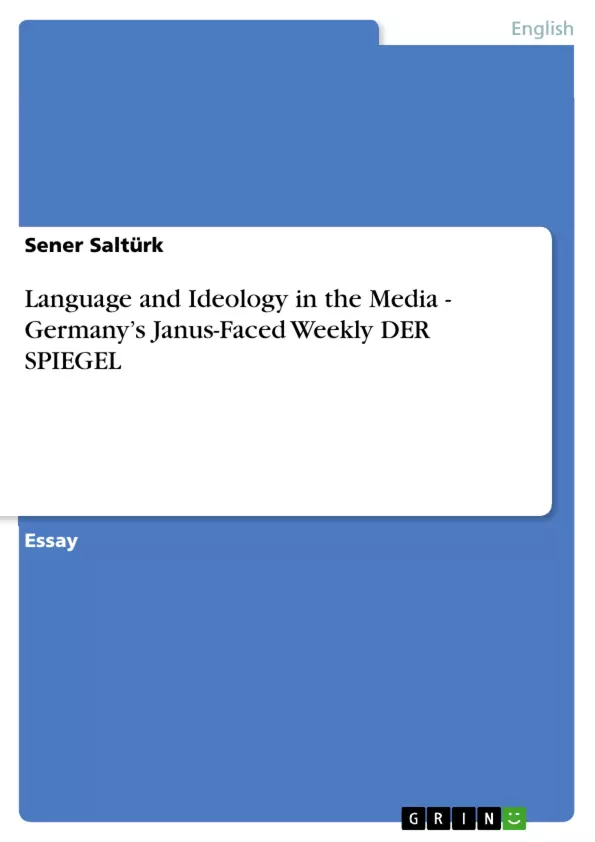Every piece of written or oral statement conveys some sort of ideology, whether it expresses
its “idea(s)” bluntly or – as is to be expected from, say, a high-quality read – by employing
effective literary devices that are designed to convince its readership. A slovenly written book
or text, on the other hand, can even carry ideological messages unknowingly and thereby lose
all its credibility and in some cases even expose itself to ridicule. A thoughtless statement,
remark or non-verbal expression (gestures / facial expressions) can challenge other people to
intervene and, depending on the rhetorics of the speaker, debunk the utterance or the kind of
expression / behaviour of the former. [...]
Table of Contents
- Language and Ideology in the Media
- DER SPIEGEL: A Controversial Weekly
- Updike's Interview: An Analysis
- The Interviewer's Statement: A Provocative Remark
- Ideology and the Role of DER SPIEGEL
- Updike's Counterargument
Objectives and Key Themes
This paper aims to analyze the relationship between language and ideology in the media, particularly in the context of a specific interview published in the German weekly magazine DER SPIEGEL. It examines the interaction between the interviewer and the interviewee, highlighting the ideologies embedded in their statements and the ways in which these ideologies are presented and contested.- The role of language in shaping and reflecting ideology
- The use of provocative language and rhetoric in media discourse
- The interplay between individual statements and broader ideological frameworks
- The representation of terrorism and its social and political implications
- The impact of media coverage on public perception and understanding of complex issues
Chapter Summaries
The paper begins by exploring the inherent connection between language and ideology, arguing that all communication conveys an ideological stance. This is illustrated with the example of the German term “Überfremdung,” which conveys a sense of threat and alarm through its linguistic construction. The author then examines the interview between John Updike and DER SPIEGEL, analyzing the ideological underpinnings of both the interviewer and the interviewee's statements.
The author delves into the interviewer's provocative statement, which challenges Updike's previous assertions about the Koran and its potential for manipulation. The author analyzes the interviewer's intention and the possible effects of their rhetoric on the reader. The paper then explores the ideological stance of DER SPIEGEL, noting its historical evolution from a left-wing publication to a more neo-liberal perspective.
The final section focuses on Updike's counterargument, which challenges the prevailing narrative surrounding terrorism and its origins. The author examines Updike's comparison of 'terrorism' with 'revolution' and its implications for understanding the complexities of violence and social unrest.
Keywords
This paper examines the relationship between language and ideology, focusing on key concepts such as provocative language, media discourse, political ideology, terrorism, and social unrest. It analyzes the use of language in shaping and reflecting ideology, particularly within the context of a specific interview published in DER SPIEGEL. The paper highlights the importance of understanding the ideological underpinnings of media discourse, particularly in relation to sensitive topics like terrorism.Frequently Asked Questions
How does media language reflect ideology?
The paper argues that every piece of communication conveys an ideological stance through literary devices, provocative rhetoric, and specific terminology designed to convince the reader.
What is the significance of the term 'Überfremdung' in this analysis?
It is used as an example of how linguistic construction can convey a sense of threat and alarm, reflecting a specific ideological message.
What was analyzed in John Updike's interview with DER SPIEGEL?
The analysis focuses on the ideological underpinnings of the interviewer's provocative statements and Updike's counterarguments regarding the Koran and terrorism.
How has the ideology of DER SPIEGEL evolved?
The paper notes a shift in the magazine's historical evolution from a left-wing publication to a more neo-liberal perspective.
What is Updike's view on terrorism vs. revolution?
Updike challenges prevailing narratives by comparing 'terrorism' with 'revolution' to highlight the complexities of violence and social unrest.
- Citation du texte
- StR Sener Saltürk (Auteur), 2006, Language and Ideology in the Media - Germany’s Janus-Faced Weekly DER SPIEGEL, Munich, GRIN Verlag, https://www.grin.com/document/204010



